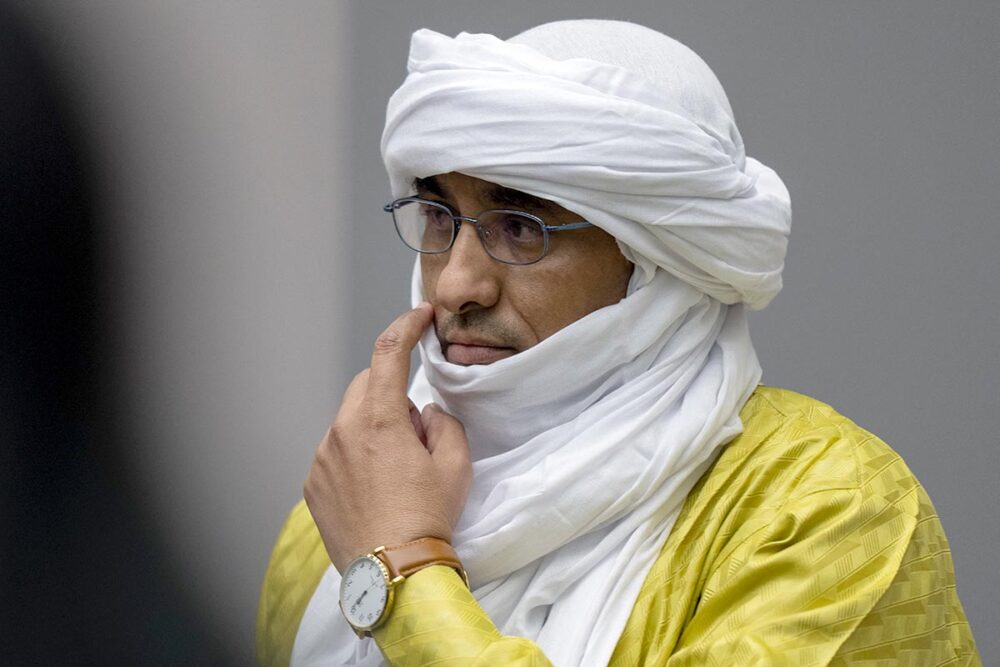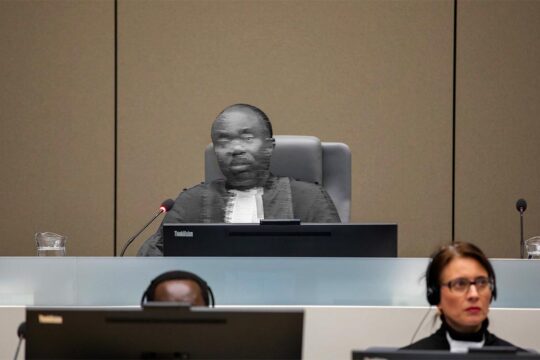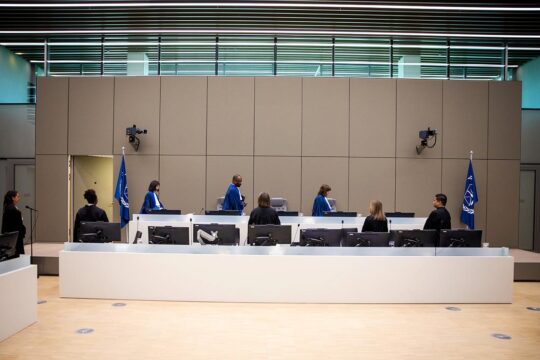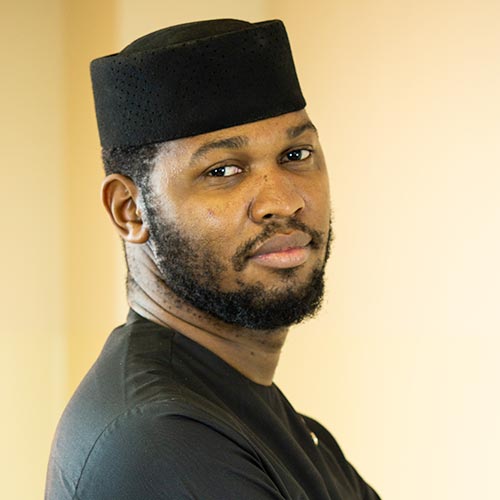For almost two hours, some 40 people gathered in a Bamako hotel room at the invitation of the International Criminal Court’s local office appeared to be very concentrated. The group was largely made up of human rights activists, but without the presence of victims. They were watching a live broadcast of the verdict against Al Hassan Ag Abdoul Aziz Ag Mohamed Ag Mahmoud, a former commissioner of the Islamic police during the occupation of Timbuktu, northern Mali, by the Ansar Eddine and Al-Qaeda in the Islamic Maghreb (AQIM) armed groups more than ten years ago. Only the ordeal of an alleged thief whose hand was cut off in public during those dark hours -- as recounted by presiding judge Antoine Kesia-Mbe Mindua -- caused the audience to react. Amidst the reactions of outrage, some noted the inexpressive, almost serene face on screen of Al Hassan, seated in the dock in The Hague wearing a lime green Bazin and traditional turban.
After a four-year trial, a majority of the three judges found Al Hassan guilty of part of the charges brought against him for war crimes and crimes against humanity committed between April 2, 2012 and January 29, 2013 in Timbuktu: torture, cruel treatment, persecution and other inhumane acts. It found he committed these crimes directly, or contributed to them with others, or aided and abetted them. However, Judge Mindua dissented and acquitted Al Hassan on all charges, apparently on the basis that he had acted under duress. More importantly, a majority of the judges cleared him of war crimes charges of rape, sexual slavery and other inhumane acts in the form of forced marriages.
“The ICC has abandoned women”
This acquittal immediately caused negative reactions in Mali. The head of a victims’ association, who requested anonymity, thinks that “the ICC has abandoned women”. She said this unbalanced verdict will exacerbate the trauma suffered by victims of sexual crimes. “I myself was assaulted during the occupation. For us in Timbuktu, Al Hassan is responsible for the crimes committed,” she continued angrily.
Seydou Doumbia, one of a group of three lawyers representing 2,196 victims, also considers the verdict unsatisfactory. “A large number of our victims of sexual crimes are not satisfied,” he confided, assuring us that the evidence presented was sufficient for Al Hassan to be found guilty. However, it is still too early to decide whether to appeal, he says. “We are a collective of lawyers and we must first adopt a common position. For the time being, we are waiting for the sentence to be handed down.” This could take several more weeks.
According to the lawyer’s analysis, the Court found that the sexual crimes had been perpetrated by members of the Hisba (morality police) and not by members of the Islamic police under the authority of Al Hassan. Doumbia finds this judgement curious. He points out that some of the rapes were committed in places under the responsibility of Al Hassan and that members of his Islamic police were involved in the forced marriages. Yehia Ahma Cissé, one of the few people in Timbuktu who agreed to testify openly, goes further. Head of the regional coordination of the Timbuktu victims’ association, he says they have witnesses who can directly incriminate Al Hassan. “He knew everything. It’s a shame that the court didn’t call us to testify. What are we going to say to the women now?” he asks. He pauses, then continues: “According to the ICC, this man they see in their minds and whose very name brings them fear is not guilty of any sexual crime. It’s incomprehensible.”
ICC Prosecutor Karim Khan, for whom the prosecution of sexual violence is an official priority, preferred in his press release to welcome the verdict. “Mr Al Hassan’s conviction marks a significant step toward holding accountable those most responsible for atrocities committed against the civilian population in Timbuktu and in the region,” he writes. “This is an important moment for the International Criminal Court and for my Office. It is the first time an accused has been prosecuted and convicted for religious persecution, and for the passing of sentences without due process.”
Talking Timbuktu
In Bamako, the ICC had set up a live feed of the verdict handed down in The Hague, but in Timbuktu, where most of the victims are based, the event seems to have gone unnoticed. “I talked all day with other leaders of victims’ associations, but none of them mentioned the verdict, which means they didn’t know about it,” says Yehia Ahma Cissé. Justice Info contacted several journalists and heads of victims’ associations in Timbuktu, who said they only found out about the verdict through these calls.
The ICC did send invitations to some people in Timbuktu, but they had to travel to the capital, Bamako, at their own expense. “For logistical reasons and because of a poor Internet connection, no broadcast was scheduled in Timbuktu,” says Margot Tedesco, the ICC’s public information officer in Mali. According to her, the ICC now intends to carry out information work, with the support of associations and the media, so that the victims are aware of the verdict and its implications. The victims are waiting to see what sentence will be handed down to Al Hassan. But they also say they are anxiously awaiting the Court’s decision on reparations. The president of a women’s association made a plea to this effect in the room during the video broadcast.
But the Court did not raise the issue of reparations at this stage. “We are no further ahead today than we were a few weeks ago. All the victims have asked for reparations, and we are waiting for clear decisions from the ICC on this,” says Cissé. In 2021, the ICC Trust Fund for Victims began paying individual reparations to victims of the destruction of mausoleums in Timbuktu. These reparations are linked to the trial of Ahmad al-Faqi al-Mahdi, who was sentenced in September 2016 to nine years in prison after pleading guilty. A year later, the court ordered individual and collective reparations of €2.7 million, including €1 million for individuals. After this new verdict in which no judge seems to agree with another, the wait for these reparations now begins.








